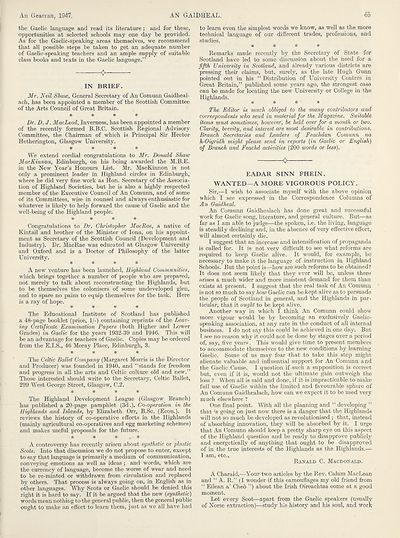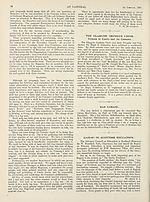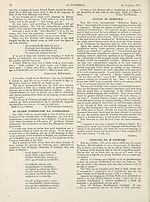An Comunn Gàidhealach Publications > Gaidheal > Volume 42, October 1946--September 1947
(73) Page 65
Download files
Complete book:
Individual page:
Thumbnail gallery: Grid view | List view

AN GAIDHEAL.
65
An Gearran, 1947.
the Gaelic language and read its literature; and for these,
opportunities at selected schools may one day be provided.
As for the Gaelic-speaking areas themselves, we recommend
that all possible steps be taken to get an adequate number
of Gaelic-speaking teachers and an ample supply of suitable
class books and texts in the Gaelic language.”
$
IN BRIEF.
Mr. Neil Shaw, General Secretary of An Comunn Gaidheal-
ach, has been appointed a member of the Scottish Committee
of the Arts Council of Great Britain.
* * * *
Dr. D. J. MacLeod, Inverness, has been appointed a member
of the recently formed B.B.C. Scottish Regional Advisory
Committee, the Chairman of which is Principal Sir Hector
Hetherington, Glasgow University.
* * * *
We extend cordial congratulations to Mr. Donald Shaw
MacKinnon, Edinburgh, on his being awarded the M.B.E.
in the New Year’s Honours List. Mr. MacKinnon is not
Only a prominent leader in Highland circles in Edinburgh,
where he did very fine work as Hon. Secretary of the Associa¬
tion of Highland Societies, but he is also a highly respected
member of the Executive Council of An Comunn, and of some
of its Committees, wise in counsel and always enthusiastic for
whatever is likely to help forward the cause of Gaelic and the
well-being of the Highland people.
Congratulations to Dr. Christopher MacRae, a native of
Kintail and brother of the Minister of Iona, on his appoint¬
ment as Secretary of the Scottish Council (Development and
Industry). Dr. MacRae was educated at Glasgow University
and Oxford and is a Doctor of Philosophy of the latter
University.
A new venture has been launched, Highland Communities,
which brings together a number of people who are prepared,
not merely to talk about reconstructing the Highlands, but
to be themselves the colonisers of some undeveloped glen,
and to spare no pains to equip themselves for the task. Here
is a ray of hope.
The Educational Institute of Scotland has published
a 48-page booklet (price, 1/-) containing reprints of the Leav¬
ing Certificate Examination Papers (both Higher and Lower
Grades) in Gaelic for the years 1932-39 and 1946. This will
be an advantage for teachers of Gaelic. Copies may be ordered
from the E.I.S., 46 Moray Place, Edinburgh, 3.
The Celtic Ballet Company (Margaret Morris is the Director
and Producer) was founded in 1940, and ‘ stands for freedom
and progress in all the arts and Celtic culture old and new.”
Those interested should write to the Secretary, Celtic Ballet,
299 West George Street, Glasgow, C.2.
The Highland Development League (Glasgow Branch)
has published a 20-page pamphlet (3d.), Co-operation in the
Highlands and Islands, by Elizabeth Orr, B.Sc. (Econ.). It
reviews the history of co-operative efforts in the Highlands
(mainly agricultural co-operatives and egg marketing schemes)
and makes useful proposals for the future.
* * * *
A controversy has recently arisen about synthetic or plastic
Scots. Into that discussion we do not propose to enter, except
to say that language is primarily a medium of communication,
conveying emotions as well as ideas ; and words, which are
the currency of language, become the worse of wear and need
to be re-minted or withdrawn from circulation and replaced
by others. That process is always going on, in English as in
other languages. Why Scots or Gaelic should be denied this
right it is hard to say. If it be argued that the new (synthetic)
words mean nothing to the general public, then the general public
ought to make an effort to learn them, just as we all have had
to learn even the simplest words we know, as well as the more
technical language of our different trades, professions, and
studies.
* * * *
Remarks made recently by the Secretary of State for
Scotland have led to some discussion about the need for a
fifth University in Scotland, and already various districts are
pressing their claims, but, surely, as the late Hugh Gunn
pointed out in his “ Distribution of University Centres in
Great Britain,” published some years ago, the strongest case
can be made for locating the new University or College in the
Highlands.
The Editor is much obliged to the many contributors and
correspondents who send in material for the Magazine. Suitable
items must sometimes, however, be held over for a month or two.
Clarity, brevity, and interest are most desirable in contributions.
Branch Secretaries and Leaders of Feachdan Comunn na
h-Oigridh might please send in reports (in Gaelic or English)
of Branch and Feachd activities (200 words or less).
<>
EADAR SINN FHEIN.
WANTED—A MORE VIGOROUS POLICY,
Sir,—I wish to associate myself with the above opinion
which I see expressed in the Correspondence Columns of
An Gaidheal.
An Comunn Gaidhealach has done great and successful
work for Gaelic song, literature, and general culture. But—as
far as I am able to judge—the spoken, i.e. the living, language
is steadily declining and, in the absence of very effective effort,
will almost certainly die.
I suggest that an increase and intensification of propaganda
is called for. It is not very difficult to see what reforms are
required to keep Gaelic alive. It would, for example, be
necessary to make it the language of instruction in Highland
Schools. But the point is—how are such reforms to be obtained?
It does not seem likely that they ever will bo, unless there
arises a much wider and more insistent demand for them than
exists at present. I suggest that the real task of An Comunn
is not so much to say how Gaelic can be kept alive as to persuade
the people of Scotland in general, and the Highlands in par¬
ticular, that it ought to be kept alive.
Another way in which I think An Comunn could show
more vigour would be by becoming an exclusively Gaelic¬
speaking association, at any rate in the conduct of all internal
business. I do not say this could be achieved in one day. But
I see no reason why it could not be done by stages over a period
of, say, five years. This would give time to present members
to accommodate themselves to the new conditions by learning
Gaelic. Some of us may fear that to take this step might
alienate valuable and influential support for An Comunn and
the Gaelic Cause. I question if such a supposition is correct
but, even if it is, would not the ultimate gain outweigh the
loss ? When all is said and done, if it is impracticable to make
full use of Gaelic within the limited and favourable sphere of
An Comunn Gaidhealach, how can we expect it to be used very
much elsewhere ?
One final point. With all the planning and “ developing ”
that is going on just now there is a danger that the Highlands
will not so much be developed as revolutionised ; that, instead
of absorbing innovation, they will be absorbed by it. I urge
that An Comunn should keep a pretty sharp eye on this aspect
of the Highland question and be ready to disapprove publicly
and energetically of anything that ought to be disapproved
of in the true interests of the Highlands as the Highlands.—
I am, etc.,
Ranald C, Macdonald.
A Charaid,—Your two articles by the Rev. Calum MacLean
and “ A. R.” (I wonder if this camouflages my old friend from
“ Eilean a’ Cheo ”) about the Irish Oireachtas come at a good
moment.
Let every Scot—apart from the Gaelic speakers (usually
of Norse extraction)—study his history and his soul, and work
65
An Gearran, 1947.
the Gaelic language and read its literature; and for these,
opportunities at selected schools may one day be provided.
As for the Gaelic-speaking areas themselves, we recommend
that all possible steps be taken to get an adequate number
of Gaelic-speaking teachers and an ample supply of suitable
class books and texts in the Gaelic language.”
$
IN BRIEF.
Mr. Neil Shaw, General Secretary of An Comunn Gaidheal-
ach, has been appointed a member of the Scottish Committee
of the Arts Council of Great Britain.
* * * *
Dr. D. J. MacLeod, Inverness, has been appointed a member
of the recently formed B.B.C. Scottish Regional Advisory
Committee, the Chairman of which is Principal Sir Hector
Hetherington, Glasgow University.
* * * *
We extend cordial congratulations to Mr. Donald Shaw
MacKinnon, Edinburgh, on his being awarded the M.B.E.
in the New Year’s Honours List. Mr. MacKinnon is not
Only a prominent leader in Highland circles in Edinburgh,
where he did very fine work as Hon. Secretary of the Associa¬
tion of Highland Societies, but he is also a highly respected
member of the Executive Council of An Comunn, and of some
of its Committees, wise in counsel and always enthusiastic for
whatever is likely to help forward the cause of Gaelic and the
well-being of the Highland people.
Congratulations to Dr. Christopher MacRae, a native of
Kintail and brother of the Minister of Iona, on his appoint¬
ment as Secretary of the Scottish Council (Development and
Industry). Dr. MacRae was educated at Glasgow University
and Oxford and is a Doctor of Philosophy of the latter
University.
A new venture has been launched, Highland Communities,
which brings together a number of people who are prepared,
not merely to talk about reconstructing the Highlands, but
to be themselves the colonisers of some undeveloped glen,
and to spare no pains to equip themselves for the task. Here
is a ray of hope.
The Educational Institute of Scotland has published
a 48-page booklet (price, 1/-) containing reprints of the Leav¬
ing Certificate Examination Papers (both Higher and Lower
Grades) in Gaelic for the years 1932-39 and 1946. This will
be an advantage for teachers of Gaelic. Copies may be ordered
from the E.I.S., 46 Moray Place, Edinburgh, 3.
The Celtic Ballet Company (Margaret Morris is the Director
and Producer) was founded in 1940, and ‘ stands for freedom
and progress in all the arts and Celtic culture old and new.”
Those interested should write to the Secretary, Celtic Ballet,
299 West George Street, Glasgow, C.2.
The Highland Development League (Glasgow Branch)
has published a 20-page pamphlet (3d.), Co-operation in the
Highlands and Islands, by Elizabeth Orr, B.Sc. (Econ.). It
reviews the history of co-operative efforts in the Highlands
(mainly agricultural co-operatives and egg marketing schemes)
and makes useful proposals for the future.
* * * *
A controversy has recently arisen about synthetic or plastic
Scots. Into that discussion we do not propose to enter, except
to say that language is primarily a medium of communication,
conveying emotions as well as ideas ; and words, which are
the currency of language, become the worse of wear and need
to be re-minted or withdrawn from circulation and replaced
by others. That process is always going on, in English as in
other languages. Why Scots or Gaelic should be denied this
right it is hard to say. If it be argued that the new (synthetic)
words mean nothing to the general public, then the general public
ought to make an effort to learn them, just as we all have had
to learn even the simplest words we know, as well as the more
technical language of our different trades, professions, and
studies.
* * * *
Remarks made recently by the Secretary of State for
Scotland have led to some discussion about the need for a
fifth University in Scotland, and already various districts are
pressing their claims, but, surely, as the late Hugh Gunn
pointed out in his “ Distribution of University Centres in
Great Britain,” published some years ago, the strongest case
can be made for locating the new University or College in the
Highlands.
The Editor is much obliged to the many contributors and
correspondents who send in material for the Magazine. Suitable
items must sometimes, however, be held over for a month or two.
Clarity, brevity, and interest are most desirable in contributions.
Branch Secretaries and Leaders of Feachdan Comunn na
h-Oigridh might please send in reports (in Gaelic or English)
of Branch and Feachd activities (200 words or less).
<>
EADAR SINN FHEIN.
WANTED—A MORE VIGOROUS POLICY,
Sir,—I wish to associate myself with the above opinion
which I see expressed in the Correspondence Columns of
An Gaidheal.
An Comunn Gaidhealach has done great and successful
work for Gaelic song, literature, and general culture. But—as
far as I am able to judge—the spoken, i.e. the living, language
is steadily declining and, in the absence of very effective effort,
will almost certainly die.
I suggest that an increase and intensification of propaganda
is called for. It is not very difficult to see what reforms are
required to keep Gaelic alive. It would, for example, be
necessary to make it the language of instruction in Highland
Schools. But the point is—how are such reforms to be obtained?
It does not seem likely that they ever will bo, unless there
arises a much wider and more insistent demand for them than
exists at present. I suggest that the real task of An Comunn
is not so much to say how Gaelic can be kept alive as to persuade
the people of Scotland in general, and the Highlands in par¬
ticular, that it ought to be kept alive.
Another way in which I think An Comunn could show
more vigour would be by becoming an exclusively Gaelic¬
speaking association, at any rate in the conduct of all internal
business. I do not say this could be achieved in one day. But
I see no reason why it could not be done by stages over a period
of, say, five years. This would give time to present members
to accommodate themselves to the new conditions by learning
Gaelic. Some of us may fear that to take this step might
alienate valuable and influential support for An Comunn and
the Gaelic Cause. I question if such a supposition is correct
but, even if it is, would not the ultimate gain outweigh the
loss ? When all is said and done, if it is impracticable to make
full use of Gaelic within the limited and favourable sphere of
An Comunn Gaidhealach, how can we expect it to be used very
much elsewhere ?
One final point. With all the planning and “ developing ”
that is going on just now there is a danger that the Highlands
will not so much be developed as revolutionised ; that, instead
of absorbing innovation, they will be absorbed by it. I urge
that An Comunn should keep a pretty sharp eye on this aspect
of the Highland question and be ready to disapprove publicly
and energetically of anything that ought to be disapproved
of in the true interests of the Highlands as the Highlands.—
I am, etc.,
Ranald C, Macdonald.
A Charaid,—Your two articles by the Rev. Calum MacLean
and “ A. R.” (I wonder if this camouflages my old friend from
“ Eilean a’ Cheo ”) about the Irish Oireachtas come at a good
moment.
Let every Scot—apart from the Gaelic speakers (usually
of Norse extraction)—study his history and his soul, and work
Set display mode to:
![]() Universal Viewer |
Universal Viewer | ![]() Mirador |
Large image | Transcription
Mirador |
Large image | Transcription
| An Comunn Gàidhealach > An Comunn Gàidhealach Publications > Gaidheal > Volume 42, October 1946--September 1947 > (73) Page 65 |
|---|
| Permanent URL | https://digital.nls.uk/125250180 |
|---|
| Description | This contains items published by An Comunn, which are not specifically Mòd-related. It includes journals, annual reports and corporate documents, policy statements, educational resources and published plays and literature. It is arranged alphabetically by title. |
|---|
| Description | A collection of over 400 items published by An Comunn Gàidhealach, the organisation which promotes Gaelic language and culture and organises the Royal National Mòd. Dating from 1891 up to the present day, the collection includes journals and newspapers, annual reports, educational materials, national Mòd programmes, published Mòd literature and music. |
|---|---|
| Additional NLS resources: |
|

